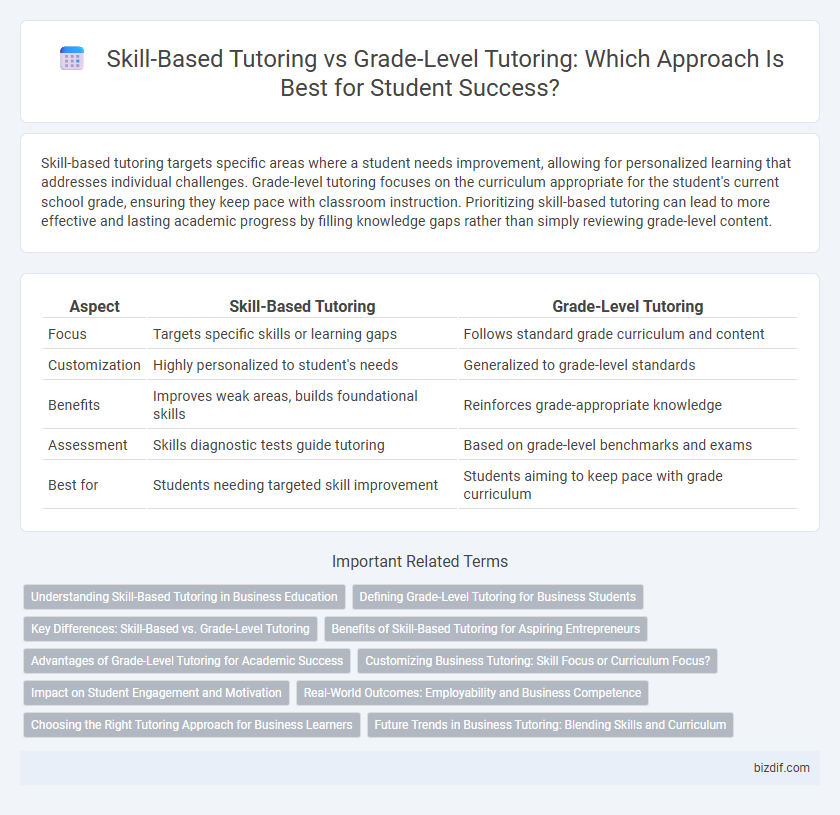Skill-based tutoring targets specific areas where a student needs improvement, allowing for personalized learning that addresses individual challenges. Grade-level tutoring focuses on the curriculum appropriate for the student's current school grade, ensuring they keep pace with classroom instruction. Prioritizing skill-based tutoring can lead to more effective and lasting academic progress by filling knowledge gaps rather than simply reviewing grade-level content.
Table of Comparison
| Aspect | Skill-Based Tutoring | Grade-Level Tutoring |
|---|---|---|
| Focus | Targets specific skills or learning gaps | Follows standard grade curriculum and content |
| Customization | Highly personalized to student's needs | Generalized to grade-level standards |
| Benefits | Improves weak areas, builds foundational skills | Reinforces grade-appropriate knowledge |
| Assessment | Skills diagnostic tests guide tutoring | Based on grade-level benchmarks and exams |
| Best for | Students needing targeted skill improvement | Students aiming to keep pace with grade curriculum |
Understanding Skill-Based Tutoring in Business Education
Skill-based tutoring in business education targets specific competencies such as financial analysis, strategic planning, and marketing techniques, ensuring learners master practical skills essential for real-world applications. Unlike grade-level tutoring, which follows a standardized curriculum by academic year, skill-based tutoring customizes lessons to address individual proficiency gaps and career goals. This approach enhances student engagement and accelerates professional development by aligning instruction with industry demands and job market trends.
Defining Grade-Level Tutoring for Business Students
Grade-level tutoring targets students according to their current academic grade, aligning lessons with standard curriculum expectations to ensure mastery of prescribed topics. For business students, this approach emphasizes foundational concepts in economics, accounting, and management relevant to their grade, promoting step-by-step competence. This method supports systematic progress through academic milestones, preparing students for advanced business coursework.
Key Differences: Skill-Based vs. Grade-Level Tutoring
Skill-based tutoring targets specific academic skills such as reading comprehension or algebraic problem-solving, allowing personalized focus on individual learning gaps. Grade-level tutoring aligns with the curriculum standards for a student's current grade, ensuring mastery of age-appropriate content and homework support. This distinction affects learning outcomes by either reinforcing weak skills or promoting overall grade proficiency.
Benefits of Skill-Based Tutoring for Aspiring Entrepreneurs
Skill-based tutoring offers aspiring entrepreneurs targeted instruction in critical areas such as financial literacy, marketing, and leadership, fostering practical skills essential for business success. This approach enables personalized learning pathways that adapt to individual strengths and weaknesses, accelerating mastery and real-world application. By emphasizing competencies over grade-level standards, skill-based tutoring cultivates a proactive mindset and problem-solving abilities crucial for entrepreneurial ventures.
Advantages of Grade-Level Tutoring for Academic Success
Grade-level tutoring aligns instruction with current curriculum standards, ensuring students master essential skills and concepts required for their academic progression. This approach fosters a cohesive learning experience by reinforcing classroom material, improving comprehension and confidence in grade-appropriate subjects. Consistent support at grade level also helps identify and address learning gaps early, promoting long-term academic success and retention.
Customizing Business Tutoring: Skill Focus or Curriculum Focus?
Customizing business tutoring requires balancing skill-based tutoring, which targets specific abilities like problem-solving and communication, with grade-level tutoring that follows a structured curriculum aligned to academic standards. Skill-focused sessions enhance practical competencies essential for entrepreneurial success, while curriculum-focused tutoring ensures mastery of foundational knowledge relevant to business principles. Emphasizing skill development tailored to individual learner needs often yields higher engagement and application in real-world business scenarios.
Impact on Student Engagement and Motivation
Skill-based tutoring targets specific competencies, fostering mastery and boosting student confidence, which enhances engagement and intrinsic motivation. Grade-level tutoring aligns with curriculum expectations, supporting students in meeting benchmarks but may limit personalization essential for motivation. Research shows skill-focused interventions increase sustained interest and active participation more effectively than uniform grade-level approaches.
Real-World Outcomes: Employability and Business Competence
Skill-based tutoring enhances employability by developing specific, market-relevant competencies such as problem-solving, communication, and technical skills, which are directly applicable in professional settings. Grade-level tutoring emphasizes academic proficiency aligned with curriculum standards but may not fully address practical business competence or workplace adaptability. Emphasizing skill-based tutoring aligns educational efforts with real-world job market demands, fostering stronger career readiness and business acumen.
Choosing the Right Tutoring Approach for Business Learners
Skill-based tutoring targets specific competencies such as financial analysis or marketing strategies, enabling business learners to develop practical expertise directly applicable to their roles. Grade-level tutoring follows a structured curriculum aligned with academic standards, which may not address the immediate needs of professionals seeking industry-relevant skills. Selecting skill-based tutoring supports accelerated learning and enhances job performance by focusing on essential business competencies.
Future Trends in Business Tutoring: Blending Skills and Curriculum
Skill-based tutoring enhances critical thinking and problem-solving by targeting specific competencies, while grade-level tutoring ensures alignment with standardized curricula and academic benchmarks. Emerging trends in business tutoring emphasize integrating skill development with grade-level content to foster holistic learning and adaptability in evolving markets. This blended approach optimizes student outcomes by combining practical skills with foundational knowledge tailored to individual business contexts.
Skill-based tutoring vs grade-level tutoring Infographic

 bizdif.com
bizdif.com